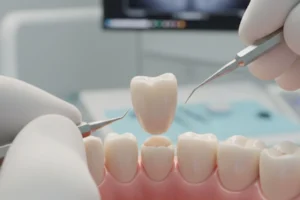Dental Implant Cost in 2025: What to Expect, What’s Covered, and Smarter Ways to Save

Dental Implant Cost in 2025: What to Expect, What’s Covered, and Smarter Ways to Save
Dental implants have become one of the most popular and reliable options for replacing missing teeth. But in 2025, one question still dominates every dental consultation and Google search: How much do dental implants really cost — and what affects that number? Whether you’re planning to get a single implant, a full-mouth restoration, or exploring affordable options abroad, this guide will walk you through everything you need to know about dental implant costs, insurance coverage, and smart ways to reduce your out-of-pocket expenses without compromising on quality.
What Determines the Cost of Dental Implants?
The total cost of a dental implant can vary significantly from one person to another. That’s because it depends on multiple factors beyond just the implant itself.
Key cost factors include:
- Number of implants needed: One tooth? A bridge? A full set?
- Location: Dental fees differ between cities, states, and countries.
- Type of implant system: Different brands and materials carry different costs.
- Additional procedures: Bone grafting, sinus lifts, or extractions may be required.
- Lab and technology fees: Clinics using 3D imaging and digital workflows may charge more.
- Dentist’s experience: Specialists and surgeons with advanced credentials often charge premium rates — and are typically worth it.
Understanding these factors helps you interpret price quotes and identify where you might save.
Is Dental Implant Cost Covered by Insurance in 2025?
Coverage has improved in recent years, but most standard dental insurance plans still only cover part of the procedure — if anything at all.
Here’s how insurance may play a role in 2025:
- Some high-tier dental plans may partially cover the crown or abutment, but rarely the surgical implant itself.
- Medicare Advantage plans in select states now offer limited implant coverage, though availability is still growing.
- Employer-sponsored plans might offer better benefits, especially if they include supplemental health options.
- Pre-authorization is key: Always submit a treatment plan to your insurer ahead of time to understand what’s included.
Can You Finance Dental Implants?
Absolutely. As implants are a significant investment, many dental clinics now offer flexible payment plans or connect patients with third-party financing providers.
Common options include:
- Zero-interest financing for a limited period
- Extended payment plans with low monthly installments
- In-house membership discounts for patients without insurance
Before signing, always read the terms carefully — especially around interest rates or late fees.
Are There More Affordable Options Abroad?
Dental tourism continues to rise in 2025. Many patients travel to countries like Mexico, Turkey, Costa Rica, or Thailand to receive dental implant treatment at a lower cost.
Considerations before going abroad:
- Check credentials: Look for internationally accredited clinics and certified oral surgeons.
- Plan for recovery time: You’ll need to stay in the country for several days or return for follow-up.
- Understand the risks: If complications occur, follow-up care back home may not be covered.
While many patients report excellent results, it’s important to research thoroughly and consider travel costs, accommodations, and the potential need for return visits.
What Are the Alternatives to Dental Implants?
If implants aren’t currently within your budget or you’re not a candidate due to bone health or medical conditions, other options exist:
Alternatives include:
- Dental bridges: Supported by adjacent teeth, but may require altering healthy enamel.
- Removable partial dentures: More affordable but less stable.
- Snap-in dentures: A hybrid between dentures and implants — removable, but more secure.
Each alternative has its own pros, cons, and cost considerations. A good dentist will help match you to the best long-term solution for your needs and budget.
How to Make Dental Implants More Affordable in 2025
Even if you’re not covered by insurance or don’t want to travel abroad, there are still ways to make implants more accessible:
- Get multiple quotes from local dentists or implant centers
- Ask about bundle pricing for multiple implants
- Use HSA or FSA funds if available
- Look for dental schools offering supervised treatments at reduced rates
- Choose essential over extras — don’t pay for luxury add-ons unless necessary
Final Thoughts: Investing in Your Smile
Dental implants are more than just a cosmetic fix — they’re a long-term solution to restore function, confidence, and health. While the cost can be significant, being informed about your options makes it easier to plan, budget, and choose the right provider.
Whether you’re just starting your research or ready to book a consultation, knowing what to expect financially can help you move forward with clarity and confidence.
Frequently Asked Questions About Dental Implant Costs
How long do dental implants last?
When properly maintained, dental implants can last 15–25 years or longer, making them a long-term investment in your oral health.
Are implants worth the high upfront cost?
For many patients, yes. They restore full chewing function, improve appearance, and prevent bone loss — benefits that cheaper options often can’t match.
Why do prices vary so much between clinics?
Experience, materials used, lab technology, and geographic location all influence pricing. Be wary of unusually low prices — they may signal cut corners.
Can I get implants if I’ve had missing teeth for years?
Possibly. Bone grafting or other preparatory treatments may be needed first. A consultation with a qualified implant dentist will provide a clear path forward.
Ready to Explore Your Options?
Start by consulting with a licensed implant specialist in your area. Bring questions, compare quotes, and ask for a detailed treatment plan — the more informed you are, the better choices you’ll make.










